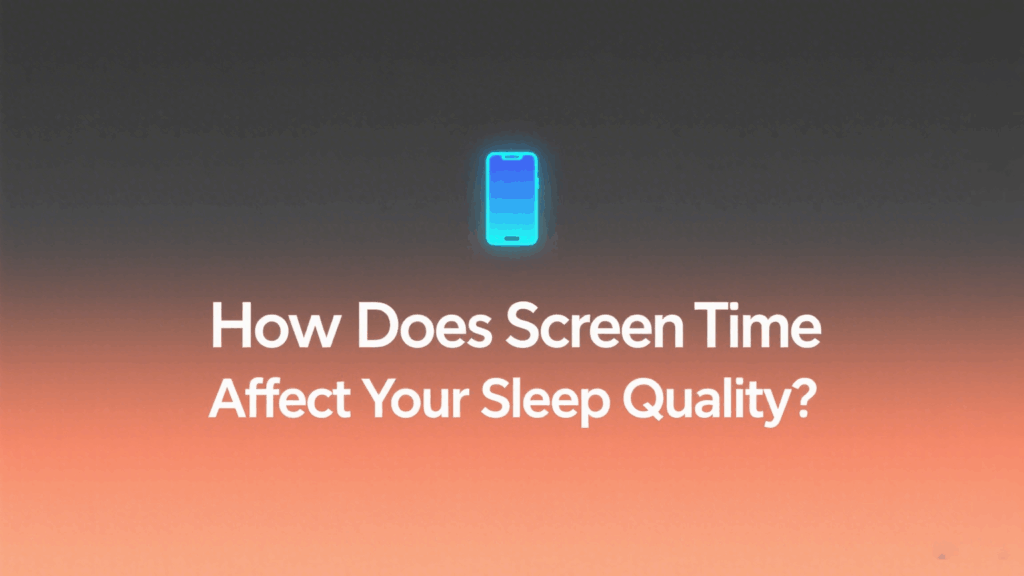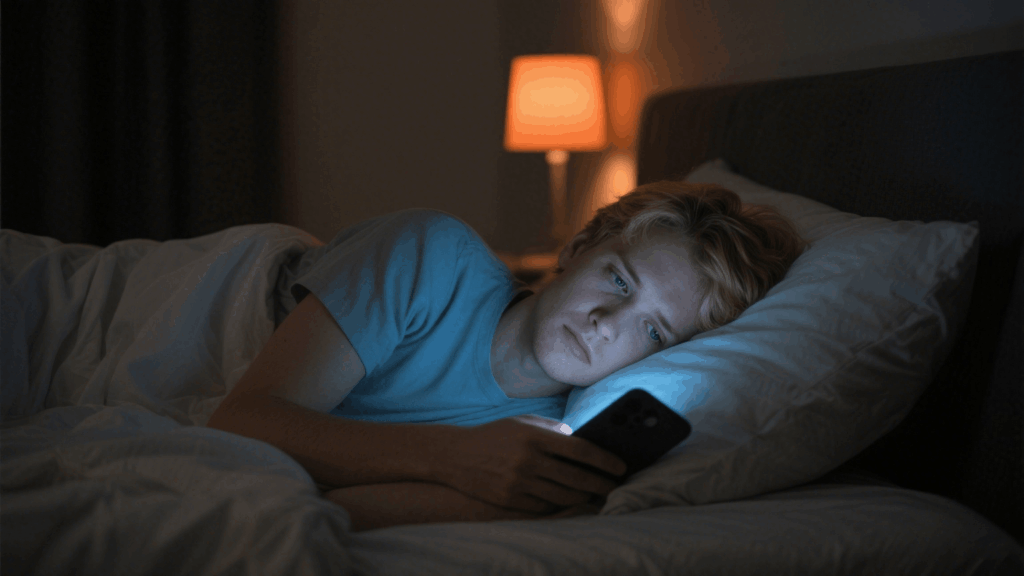Have you ever asked yourself this question? Do you toss and turn at night when you go through social media? You can find the answer in the scientific research about screen time and sleep quality.

As stated by the National Sleep Foundation, the usage of screens by 58% of the American population within an hour before bedtime is making a big dent in their sleep routines. The technology has a direct influence on the sleep-wake cycle of the individual by emitting blue light, which in turn prevents the production of the hormone melatonin (responsible for sleep) and keeps the brain in an excited state instead of relaxed and alerting it when one should be falling asleep.
In detail of this guide, we will cover:
the blue light that disrupts your natural sleep-wake cycle.
• The effect that the use of pre-bedtime screen has on the human psyche.
• The effect of different devices on sleep quality.
• The solutions for good sleep habits that are really workable for you
Whether you have sleepless nights, and you want to change that or if you simply want to sleep in a better way, understanding the connection between screens and sleep is a must. Let’s learn more about the research and explore ideas on how to re…
– According to the newest findings, the sleep quality of individuals goes down significantly as every extra hour on a computer leads to decreased sleep quality and increased daytime sleepiness.
– The effects of screen time are not only limited to the physical body but also cover the psychological point by which mental health and whole sleep patterns are affected due to the excitement that comes from using the devices and engaging with the content.
The Science Behind Screen Time and Sleep
How Blue Light Affects Your Brain
Each time you watch the screen of your laptop or cell phone, the light you see is in the form of a blue one that closely resembles the daylight. In turn, your brain will not be able to recognize the difference and believe it is still daytime and that is what will retrain your body from operating normally. As an outcome of this misleading concept, the sleep-inducing hormone, such as melatonin, will not be produced at the right level which, in turn, will result in increased drowsiness.
Impact on Circadian Rhythms
The cycles of the moon can be compared to the fluctuations of cyclically recurring natural state changes in the biological clock of the human body. In view of this research and its significant observation, the researchers were made aware that screen usage in the evening indeed affects this internal clock. In the absence of natural sunlight, the blue light tricking the brain makes it difficult even in the best of conditions to maintain a consistent sleep schedule. For someone to get sleep that is of lower quality and still manage to be active throughout the day, he/she might be subjected to this kind of disturbance.

Modern Screen Usage Patterns
Key Research Findings
The quick acceptance and rapid development of the new technical medium of communication have made it possible for people to make remote spontaneous discussions and searches, especially, in this pandemic era of technology. In such an environment, surface travel is seen as an alternative to air travel. This socially efficient technique is not only convenient for the rich but also affordable for the poor. This method of regular meetings is still one of the most beneficial and efficient ways of developing new projects and gaining access to new territories from conducting meetings to seminars. If the trips are short, passengers go to the respective departure airport, board the airplane shortly after check-in, disembark and take a taxi from the airport to the destination. On the other hand, for long-distance travel, people have the opportunity to travel with several clothe as there is a wider espacio for the storage of cargo in the vehicle. Again, whenever the mode of transportation is the sea, the area is most likely to be the port. From here, travelers will go on board the ship for the journey. By this time there haven’t many long-distance travelers who have embarked on the road.
A global analytics cross-sectional study has indicated that 70% of the people check their phones within 5 minutes after they wake up, while 89% utilize screens just before sleeping. The pattern of recurrent screen use has really been well-established in our daily lives.
Impact on Different Age Groups
It can be obviously observed that the behavior and many other factors affect groups of various ages in different ways. The young from 8 to 18 years old are now spending at least 7.5 hours daily playing games or watching their favorite series without counting school-related screen time. Those in their teenage years are top performers with an average of 9 hours of engagement every day.
While those individuals aged 20 to 30 claim that the most time spent with screens is related to social media and streaming, the elderly predominantly utilize screens for getting news and being in communication with their family. Daily working professionals belonging to different age groups show an average screen time of 6-8 hours of work.
Research-Backed Evidence
Short-term Effects
Immediate effects take place in the brain when a person uses a screen shortly before bedtime. The research found that the late-night screen use resulted in the next day the person feeling excessively sleepy and may affect the level of alertness and productivity. Your mood can also be upset, as inadequate sleep may generate mood swings and concentration problems.
According to the research done by the Sleep Foundation, 60% of the people that use electronics before they go to bed have a longer time (comprised of 60% of the time) to sleep than those that do not. Such a disturbance in the sleep initiation phase of your sleep cycle, results in less or no REM sleep; thus, your sleep may not be restorative.
Long-term Consequences
The situation described above, long-term exposure to screens during the night, is quite dangerous healthwise especially if this goes on over a period of time. This point is proved by research after research stating that obstructed sleep initiated by screen viewing is a good generator of stress and depression, as well as risk factors of these pathologies. Your body’s own natural rhythms will be upended in a serious way making it virtually impossible for you to have a good night’s sleep every day.
An investigation, which has become a benchmark study, in the Journal of Clinical Sleep Medicine showed that those who used screens during the period before the bed frequently were 1.5-fold more likely to have real insomnia. The lack of good and consistent night sleep may then lead to many physical and psychological problems out of which many things are your general health.
Physical and Mental Health Implications
Creating Healthy Boundaries
Making a screen-free zone in the bedroom can be a very effective and yet simple way for you to manage your situation, both physically and mentally. During the night, when you expose your eyes to strong light emitted by your screens, there could be a chance of getting eyesoreness, headaches, and a disturbed sleep pattern. These personal boundaries allow you to have a normal life with your electronic devices and still be able to give priority to your own resting needs.
Device Settings and Adjustments
Undoubtedly, the control of the brightness of the screen is closely related to the degree of harm towards human health. Adjusting the light to the lowest level in the evening is beneficial for both the health of your digital eye and the reduction in the amount of melatonin secretion suppression. Additionally, make sure to turn on blue light filters and night mode features on your device’s display for less strain on the eyes.
Building Better Sleep Habits
Alternative Evening Activities
Prolonged exposure to poor-quality screen displays that are full of brightness is a major concern for eye safety. The bad effects of such exposure can lead to problems with health, such as:
– By always being inactive one is being at a greater risk of obesity.
– Constant reaching the others through the phone and the internet. Those who are more prone to use digital devices are the ones who are already stressed.
– The pain you carry daily on your neck and shoulders due to the bending of your back.
– A little number of the population takes part in some activities. Sedentary lifestyle that is associated with watching TV as evidenced by reduced physical activity.
– Quality sleep gets affected if you are always on the screen and at the same time your mind becomes tired which together result in low productivity.
Breaking free from screen use before bedtime doesn’t imply that you are forced to just sit and not participate in any other activities. There are several helpful activities, which, on the one hand, save your precious hours of sleep, and on the other hand, keep you away from the bondage of poor sleep.
Switching to a physical book or magazine as a bedtime activity instead of your e-reader is a fine idea. Besides not emitting blue light and being environmentally friendly, the printed words on paper can give your mind a chance to unwind. Another way to express your feelings and throw away the troubles that are still with you after the day is to keep a journal where you can put your thoughts and process them.
Light stretching is a form of exercise that helps to cool down the tension within the muscles and prepares your body for sleep. They help you to relax and free your mind from the overstimulating effect that is brought about by screen usage. If you do not want to do any exercises, you can also meditate or take deep breaths that bring peace to both your mind and body.
Additionally, drawing, coloring, and other activities like these will not only consume your time but they will also give you a sense of satisfaction. Such mental activities keep the brain active but at the same time, they are not disturbing that they make it easy for one to switch off so as to have some sleep. Even the basic tasks of preparing tomorrow’s wear or lunch can relax your mind as they make you feel more prepared, hence, sleep better.
Conclusion
The correlation between the hours spent on the gadget and the quality of sleep has been affirmed in several scientific studies. Knowing precisely in what way the blue light component influences our body’s internal rhythm as well as executing the advice given can allow us to become the master of our sleep quality control. Let us keep in mind that even small modifications such as not using the screen before sleeping and changing the settings on the device can result in notable changes in our sleep quality.
Tonight, take the initiative to set up a no-gadget 30-minutes period before you sleep. The normal rhythm of your body’s sleep and being awake will shortly start to be maintained and you will be able to sleep calmly and feel fresh in the mornings. It is understandable that there are numerous technological advancements in the world that are synchronized with the daily habit of sleeping. However, these advancements should not affect our sleep negatively.
Are you ready to improve the quality of your sleep? Start by introducing changes one by one, for example, starting with the use of the blue light filters or setting up a gadget-free zone in the bedroom. After completing the transition to this or that habit, you will be grateful to yourself for consistently choosing healthy sleeping-patterns that have a solid base in science. Goodnight!